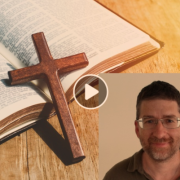In Part 3 of the 5-part series I wrote for Orthodoxy and Heterodoxy on why I stopped being a Calvinist, I explored the existential problem that arises from the split teleology inherent in Calvinist metaphysics and their fragmentation of God’s will into competing modalities.
Reformed theology generally affirms that with respect to God’s revealed will, the telos or goal of each and every individual includes eternal union with Him, but with respect to His hidden will, the telos of certain individuals includes eternal disunion with Him. This means that for everyone that isn’t saved, there is a dual telos, for in one sense God’s desired end for such people is salvation, but in another sense it is damnation.
One of the problems I raised against this model in Part 3 of my series is a purely personal or existential problem I encountered when wrestling with this framework.
The existential problem is that because God reveals Himself to mankind in terms of the mode of His revealed will (which includes the desire for everyone’s salvation) while relating to mankind in terms of the second mode (His hidden will, which includes a desire for some men not to be saved), a radical discontinuity is thereby set up between God as He is and God as we experience Him.
Although there are ways of getting around the purely logical inconsistency that exists between a universal affirmative and a particular negative statement on the square of opposition (for example, by distinguishing the types of desire and willing that regulate God’s actions in the revealed vs. the hidden modes), this doesn’t touch the existential problem I encountered when trying to have a relationship with such a God. As I explained in the aforementioned article, “This discontinuity [between God in his revealed condition vs. His hidden condition] creates a host of practical difficulties when it comes to trying to have a relationship with the Calvinist God, since it means that our experience of God is fundamentally disconsonant from who He really is.”
The practical difficulties emerge even clearer when we consider how reformed thinkers typically handle the events recounted by Jeremiah the prophet. All Calvinists will affirm that during the time of Jeremiah when the people were sacrificing their children to the fires of Molech, this only occurred because it was part of God’s eternal decrees. Yet they are also compelled to say that God reveals Himself as being so horrified by the act that, anthropomorphically speaking, He could declare that such a thing had never even entered His mind (Jer. 19:5; 32:35; 7:31). Where does this leave us? It leaves us with a constant discontinuity between God as He is in Himself (i.e., continually decreeing evil) vs. the mode by which God accommodates Himself to us (i.e., continually willing non-evil).
If we dwell on this, it leads to existential problems that can drive a person mad. Calvinists generally recognize this, which is why they continually urge us to bracket off our knowledge of how God really is from How God has accommodated Himself to us. In fact, Calvinists have frequently told me not to try to relate to God in terms of what we know to be true with respect to His eternal decrees. For example, even though we know that for everything that happens, nothing could ultimately have been otherwise, we must nevertheless act as if there is an element of real meaningful contingency. Again, we know that the telos of many people is eternal disunion with God, but we must act as if the telos of every person is eternal union with Him. Once again, we know that God does not actually love every person, but we must act as if the statement “He is a good God and loves mankind” applies to everyone. And on and on.
Calvinism thus requires us to constantly suspend belief in order to have a relationship with God. This is especially true when we approach verses like Ephesians 5:1 and Matthew 5:48 about being imitators of God. A Calvinist believes it would be disastrous to imitate God as He actually is, and urges us only to imitate Him as He accommodates Himself to us.
Further Reading
- Why I Stopped Being a Calvinist (Part 1): Calvinism presents a dehistoricized Bible
- Why I Stopped Being a Calvinist (Part 2): Calvinism Destroys God’s Justice
- Why I Stopped Being a Calvinist (Part 3): Calvinism Dislocates God From our Experience of Him
- Why I Stopped Being a Calvinist (Part 4): The Heresy of Monergism
- Why I Stopped Being a Calvinist (Part 5): a Deformed Christology
- Was Calvin a Nominalist? Part 1: Historical and Theological Background
- Was Calvin a Nominalist? Part 2: Surveying the Scholarship
- Was Calvin a Nominalist? Part 3: Voluntarism, Nominalism and the Theology of Calvin


